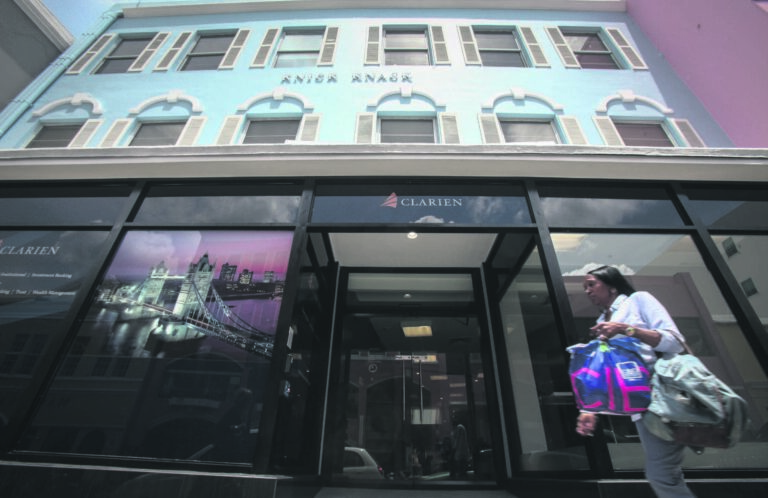More customers have adopted online services during pandemic
BY ANNABEL COOPER
With the move into prestigious Point House imminent, a growing number of digital options and products being rolled out, and a determined drive to become “Bermuda’s best bank”, Simon Van de Weg, Clarien’s chief banking officer, explained how his team is challenging Bermuda’s traditional banking sector.
Clarien has come a long way since the days of Gibbons Deposit and Capital G, but one thing that hasn’t changed, said Mr Van de Weg, is its commitment to personal banking. “It’s something we’re very proud to do.”
On the retail banking side, Clarien offers traditional account banking as well as investment services, and when its moves into Point House, that will be its primary location.
“We’re excited,” he continued. “This move is important for us because it represents a few things. It’s a statement of our intention. What we want to become, what we are becoming and we want to be the best bank in Bermuda. That location supports that aspiration.”
Clarien has undergone a process of reinvention since rebranding in 2014 and there has been a strong focus on the development of personal banking technology.
“We just saw a very big change induced by the response to Covid-19,” he said. “What we saw is a lot of previously hesitant personal banking clients adopt digital card payment and self-service in the bank. Because that adoption has saved those people time, money and empowered them with information and the ability to manage their financial situation, we don’t expect those people to revert back.”
With this in mind, Clarien recently launched a digital account-opening service for single-named accounts, meaning people don’t need to go into the bank or fill out physical forms to open an account. They plan to add joint account capability in 2022.
Clarien also has the ‘iInvest’ product using their robo-adviser platform whereby a client can “self-serve” to go through their financial goals and information. The product then uses technology to allocate and manage the funds for smaller amounts of money.
What this means, he explained is, “an average investor with, say, $10,000 to start out, would be able to avail themselves of the same very efficient and professionally designed investment strategies just like they were a high-net-worth investor.”
In spite of the shift towards more digital banking however, there is a simultaneous shift towards becoming more personal. “Clarien”, he said, “is able to reposition staff from payment processing roles, record keeping and document-handling roles, and transition those resources into consultative roles. So, working with clients to identify their financial goals, developing solutions and facilitating clients on that journey.”
Away from retail banking, Clarien has made a “concerted effort” to learn about the fintech sector, in particular insurtech and crypto-focused businesses.
“It took us to decide on really focusing on servicing that sector and we took time to redesign processes and collaborate to be able to do that,” he said. “We’re interested in partnering and supporting the development of this industry in Bermuda.”
What they are not interested in, however, is dealing with digital assets.
“We don’t have, nor do we plan to try to provide digital-asset custody services,” he said. “The exchanges are experts at it. We would probably look to work with the specialists in the field to be a banking partner rather than taking a position.”
The Government has talked about opening Bermuda’s banking sector up to more competition, but this doesn’t concern him. “We’ve been the challenging and new bank for a while now and I know that when we’ve competed, things change.”

